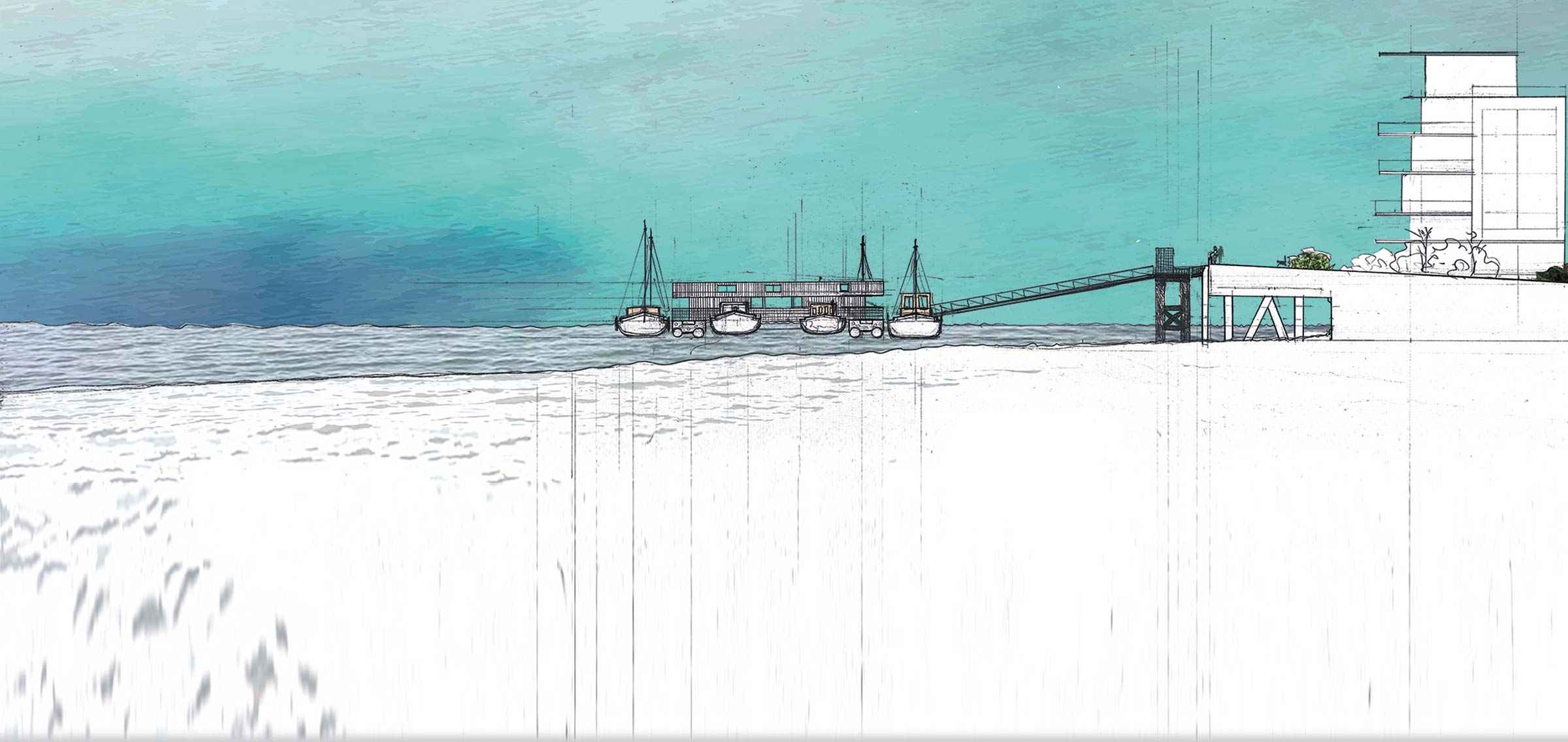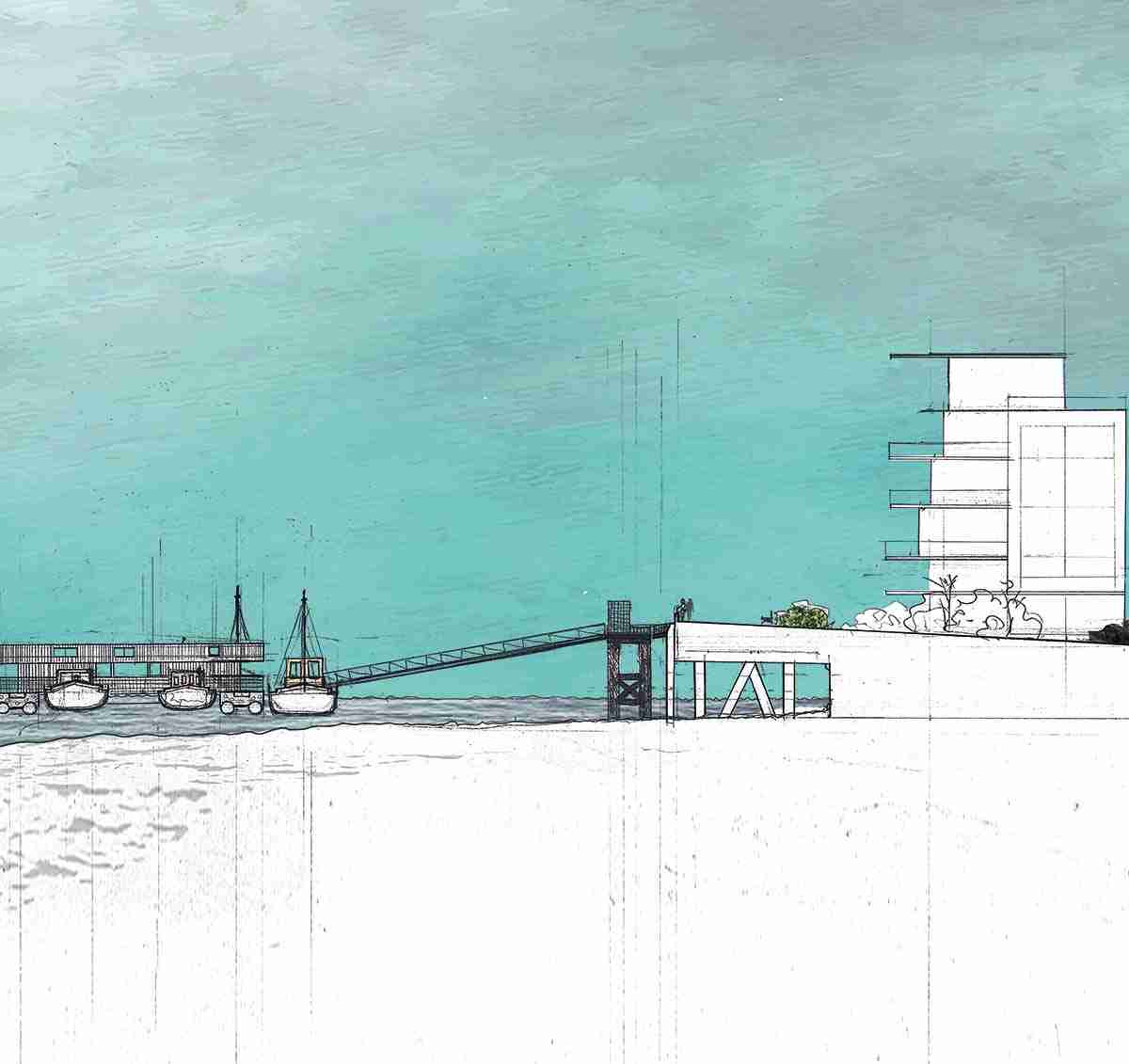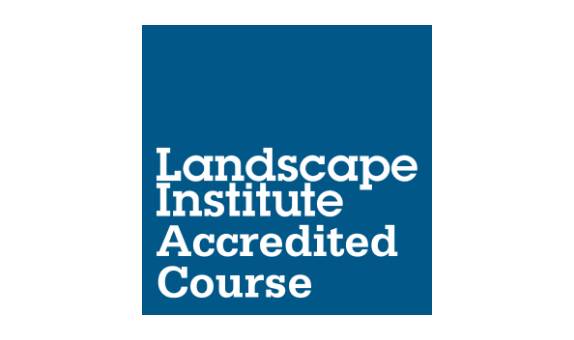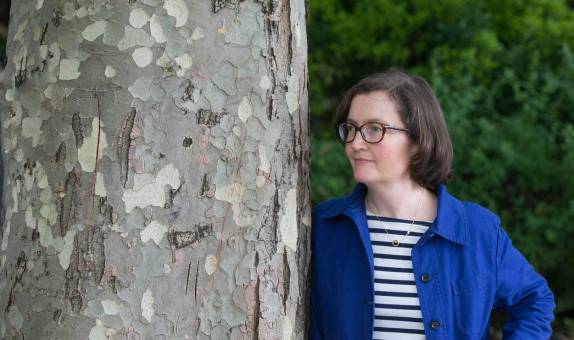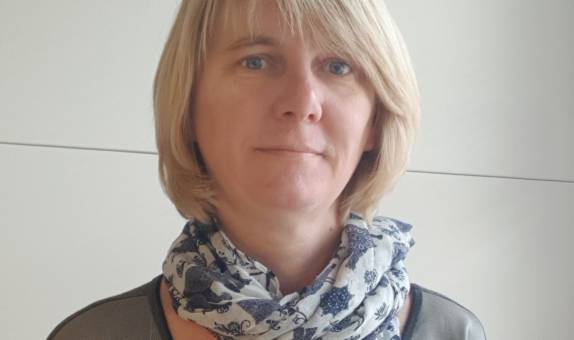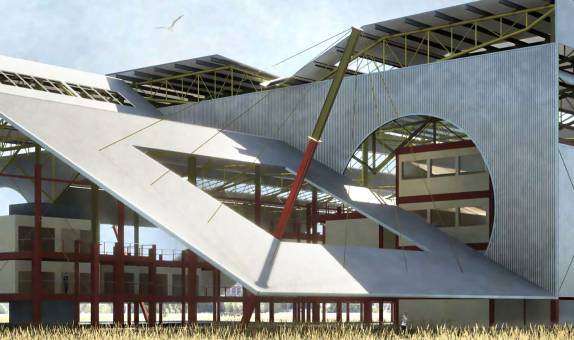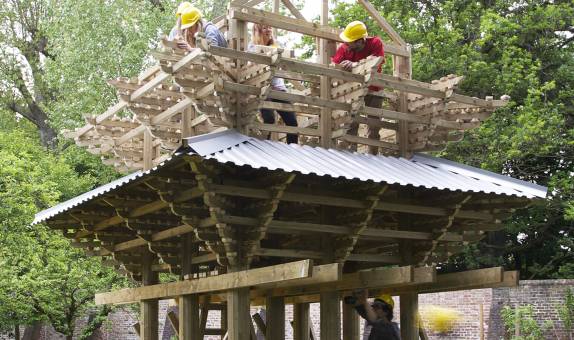Landscape Architecture MLA (LI accredited)
Why choose this course?
This course comprises a conversion year followed by a masters year and includes study visits and opportunities to collaborate on live projects with client and community engagement and working with experienced practitioners on site.
Design is at the heart of this course, with projects reflecting future opportunities for a landscape architect and forming part of your personal portfolio.
Live design projects will be reviewed by clients and may be the subject of community consultation. All design reviews are performed with the participation of leading landscape architects among the critics.
Please follow our Architecture & Landscape Instagram to see some of the great work we are doing.
| Mode | Duration | Attendance | Start date |
|---|---|---|---|
| Full time | 2 years | 2–3 days per week | September 2024 |
| Part time | 4 years | 1 day per week | September 2024 |
| Main location | Kingston School of Art, Knights Park |
Reasons to choose Kingston University
- The course can form the route to the professional Pathway to Chartership, an online tool measured against the LI Chartership syllabus.
- The University has established local, European and international networks and the location offers opportunities for contemporary design projects.
- You will work closely with architecture students in an art school environment using purpose-designed architecture studios, designed by Stirling Prize-winning architects Haworth Tompkins.
The Art School Experience
As part of Kingston School of Art, students on this course benefit from joining a creative community where collaborative working and critical practice are encouraged.
Our workshops and studios are open to all disciplines, enabling students and staff to work together, share ideas and explore multi-disciplinary making.

Accreditation
The Landscape Institute
Our course is accredited by the Landscape Institute (LI). Accreditation requires education providers to meet important criteria which ensure high standards are maintained, meaning you can be sure your course meets the standards needed for you to enter the landscape profession.
What you will study
All design projects are developed as part of a personal portfolio that can be immediately used to target employment. Projects reflect critical challenges and opportunities of contemporary landscape practice including green and blue infrastructures, resilient and adaptive strategies, detailed design of places for people, planting, biodiversity, transformation and change through time. Workshops include: model making (in the Faculty's 3D workshop), mapping, drawing, digital media, materials and construction.
Our London location, established local, European and international networks, and Landscape Interface Studio provide the focus for contemporary landscape design projects that address immediate and long-term landscape solutions for cities and their regions.
Modules
The course begins with a series of intensive workshops with expert practitioners for rapid assimilation and application of key landscape architecture skills, techniques and knowledge.
The course includes study visits and opportunities to collaborate on live projects with client and community engagement.
Summer work experience and a critical case study engage students with an immediate context of practice and the opportunity for dialogue with practitioners in relation to projects on site.
Core modules
Landscape Architecture: Primer
60 credits
A Landscape Architect synthesises a complex range of issues, design aspirations and inspirations to produce projects which strategically engage individuals, communities and society with place in practical, personal, cultural and political ways. The material practice of landscape architecture responds to and engages with the dynamic, constantly changing conditions of the living world. Representations of landscape both construct its meaning and are fundamental to the processes of its design; a range of representational techniques underpin the act of design and the communication of proposals.
This module recognises the breadth of knowledge and skills and the range of experiences of the student group, and extends these to provide the necessary foundation for landscape architecture studies. The module supports students in developing shared learning alongside individual development, experimentation and expression, appropriate to the needs of each student. The module primes students to undertake practices of landscape architecture through a series of workshop-lab exercises led by specialist practitioners, concluding with the production of a Landscape Architecture Primer document which will underpin the work throughout the course.
Landscape Architecture: Portfolio
60 credits
Through a process of primary and secondary research across a broad range of subjects, Landscape architects appraise the fundamental conditions of site and context, in order to inform a strategic design approach for a particular place. Landscape architecture interprets and transforms the interactions and inter-relationships between a diverse range of physical, environmental, social and cultural factors. The successful integration of professional and technical issues within a developing design process is fundamental to landscape architecture; this process of synthesis requires sensibility, critical self-reflection, iteration and team work.
The module targets the delivery of a creative Landscape Architecture portfolio of design projects that explore the identification of factors of local distinctiveness, and demonstrate the momentum and achievement of the first phase of the Landscape programme. This provides a platform for the critical case study and possible direction for summer work experience, and defines the trajectory of the second year of study.
Landscape Architecture Professional Practice: Design & Making
30 credits
Good design successfully integrates ethical, regulatory, financial and professional conditions within a material practice. These elements are integral to a creative process and the development of a coherent, successful landscape architecture proposition.
The profession of landscape architecture sits in a context of interdisciplinary production and delivery, and is subject to code/s of conduct and professional body requirements. Landscape architecture professionals engage in an aesthetic, pragmatic and ethical use of materials, construction and aftercare, employing techniques for resilience, adaptation, and green and blue infrastructures.
The module supports the Landscape Architecture Thesis Project process and ethos of design project development, making and resolution, within UK and international contexts of professional practice.
Landscape Architecture: Reading, Research and Narrative
30 credits
Landscape architecture and urbanism is shaped by historical, contemporary, and visionary seminal ideas. Narratives of landscape architecture relate to temporal and spatial scales of practice: development, regeneration, infrastructure and responsibility, from the small local scale to the city, its region and international context.
This module focus brings together the consideration of theory, research and narrative, in the context of the practice and communication of landscape architecture. The module supports students' engagement in research processes and enables them to apply a critical knowledge of the concept and theory of research methodologies, to further develop a theoretical grounding and literacy in landscape architecture, and to support research-informed design practice.
Landscape Architecture: Thesis Project
60 credits
The development of a research design thesis reflects individual ambition, curiosity and creativity, in this expanding field of practice, and seeks to test relationships between Landscape practice and related co-professional activity, benchmark projects and measurable ‘values'. The thesis project requires that sophisticated thinking, clearly articulated strategies and analytical research techniques are applied to the synthesis of ideas, development and resolution of a project.
This module is the ‘capstone project' and the culmination of a student's educational experience of the MLA programme. It offers the opportunity for students to articulate their developing position as landscape architects and professionals. Within this module students can refine an interest and ambition emerging from study within preceding modules and prior experience, and articulate a specific expertise or focus within the scope of the profession.
The project will be presented and curated in a format for digital publication or exhibition appropriate to the theme and anticipated audience. Students are encouraged to define aspirational agendas that address current challenges: economic, environmental and social, and define appropriate goals in this dynamic field of practice. The digital publication or exhibition will be the edited and outward facing expression of the thesis project, supported by the thesis project portfolio in the context of this module.
Entry requirements
Teaching and assessment
You will be taught by an experienced teaching team whose expertise and knowledge are closely matched to the content of the modules on this course. The team includes senior academics and professionals, many of whom have their own architectural practices and are involved in the delivery of different elements of this course.
Who teaches this course?
Teaching is delivered by a team of ambitious and creative design practitioners and researchers.
The team includes senior academics and professionals, many of whom have their own architectural practices and industry contacts.
You'll be taught in classroom-based seminars, tutorials and lectures, alongside site visits to the world-famous Royal Botanic Gardens at Kew, museums, galleries, auction houses and other creative professional environments.
Our excellent reputation means that industry leaders regularly visit our student shows to see the best of the new talent.
This course is taught at Kingston School of Art, based at the Knights Park campus.
Fees for this course
Additional costs
Depending on the programme of study, there may be extra costs that are not covered by tuition fees which students will need to consider when planning their studies. Tuition fees cover the cost of your teaching, assessment and operating University facilities such as the library, access to shared IT equipment and other support services. Accommodation and living costs are not included in our fees.
Where a course has additional expenses, we make every effort to highlight them. These may include optional field trips, materials (e.g. art, design, engineering), security checks such as DBS, uniforms, specialist clothing or professional memberships.
Facilities
Kingston School of Art at Knights Park is situated on the Hogsmill River, with its restaurant and bar opening on to the waterside. It has a friendly, creative feel and benefits from recently-refurbished workshops and studios, a reception area with a gallery, art shop and space, and the light and airy open-plan learning resources centre. There are also well-equipped lecture theatres, seminar rooms and computer resources.
For most courses, learning takes place in fully-equipped specialist studios. You will take part in classes, tutorials and critical reviews with fellow students. This strong studio culture ensures regular interaction between students and tutors.
For non-studio-based courses, learning takes place in classroom-based seminars, tutorials and lectures, alongside site visits to museums, galleries, auction houses and other creative professional environments.
After you graduate
Examples of recent graduate destinations for this and similar courses include:
- senior landscape architect ARUP Environmental
- landscape architect Churchman Landscape Architects London
- landscape architect Gustafson Porter London and Seattle
- landscape architect Grant Associates Bath
- associate director landscape architect AECOM
- landscape architect HTA Design London
- director Spacehub London
What our graduates say
Links with business and industry
You will be encouraged to engage closely with the diverse businesses that make London one of the most important centres for the creative industries. Students on this course have had the opportunity to work on collaborations with industry partners on both a national and international scale.
Research areas
Many of the staff in the Kingston School of Art are research active. Their research ensures they are in touch with the latest thinking and bring best practice to your studies. Below are examples of projects undertaken by the Landscape Interface Studio.
Course changes and regulations
The information on this page reflects the currently intended course structure and module details. To improve your student experience and the quality of your degree, we may review and change the material information of this course. Course changes explained.
Programme Specifications for the course are published ahead of each academic year.
Regulations governing this course can be found on our website.
